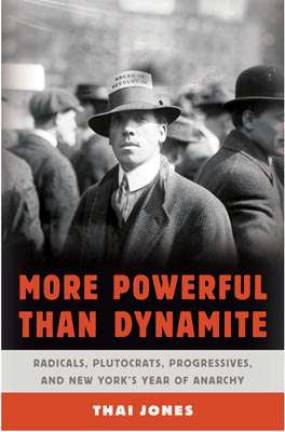Talking Up Downtown with Thai Jones and Bill Ayers

Few city residents realize it, but today's Occupy protests are rooted in events that took place nearly a century earlier. New York City journalist and author Thai Jones is keenly aware of this fact as he specializes in researching and writing about radical political movements from the 20th century. His latest book, More Powerful Than Dynamite: Radicals, Plutocrats, Progressives and New York's Year of Anarchy, serves to propel Jones' body of work forward as it chronicles a city perilously close to chaos in 1914 just as the country was inching toward World War I. Moreover, Jones, a former reporter for Newsday and the Albany Times-Union, brings a measure of personal experience on writing about radical political movements as the son of former members of the Weather Underground, a 1960s communist revolutionary group that carried out a campaign of bombing public buildings in protest of the Vietnam War. In 1970, associates of Jones' parents were killed in a Greenwich Village townhouse explosion as members of the Weather Underground were preparing nail bombs to be used later at a New York City social gathering frequented by soldiers. Bill Ayers, a retired professor of education from the University of Illinois in Chicago, is best known for his work in urban educational reform as well as his late-'60s and early-'70s political and antiwar activism when he co-founded the Weather Underground movement. During the 2008 presidential campaign, Ayers found himself at the center of a controversy stemming from his contacts with then-political candidate Barack Obama. Today, May 3, NYC's Tenement Museum will provide a fitting backdrop for Jones as he joins with Ayers to discuss his book, politics, research and how Ayers' firsthand political activism and radicalism intersects with Jones' researched history of the left. Our Town Downtown caught up with both Jones and Ayers to find out more about More Powerful Than Dynamite and the upcoming talk at the Tenement Museum. OTDT: What compelled you to write More Powerful now? Was it the OWS movement? TJ: Actually, this project was years in the making and I submitted the final draft to the publisher in June. The Occupy Movement began in New York City in September, so the parallels are entirely fortuitous. As soon as the protests began I tried to be on hand whenever I could. For me, going down to Liberty Square and joining the demonstrations as a participant-and also as an observer-was an incredibly moving and inspirational experience. Every day down there was equivalent to a month of research. OTDT: Do you see any similarities between the conditions in 1914 NYC and today's OWS? BA: The portrait of New York City, 1914, that Thai Jones paints so skillfully brings the parallels with conditions today into sharp focus. ? The deepest parallel I registered was the complex humanity of each person swimming through a dynamic history in-the-making, building an identity without guarantees-just like each of us. OTDT: Do you support the OWS protesters? What parallels do you see between OWS and the Weather Underground? BA: Yes, yes, yes. Occupy is an invitation and an opening, not a point of arrival, and it's already won in important ways: the 1 percent is exposed, the frame is changed, and the 99 percent are getting mobilized against war and planetary destruction, for peace and simple fairness. Occupy is recreating the public square as a place where every grievance and every aspiration can find space to breathe, and it's a metaphor being applied everywhere as activists fight for public education, workers' rights, health care, peace, prison abolition and housing. OTDT: What impact did your parents' going into hiding for a decade have on you? What did you think, at the time, about what they were doing regarding involvement with the Weather Underground? TJ: I was 4 years old when the FBI beat down the door of our apartment in the Bronx and took my parents to jail-in the end, they did not have to serve any time. My father received community service and parole, and the charges against my mother were dropped. So I didn't have any concrete feelings about their activities at the time. All I knew was that we had some secrets that weren't to be discussed, and that every so often my name would change. OTDT: What are your thoughts on our recent involvement in conflicts in Iraq, Afghanistan? Were we/are we justified being in either country? BA: Those invasions have been predictably catastrophic, both for the people of those lands who are suffering death and dislocation and destruction and who have opposed the U.S. presence in huge, super-majority numbers, and to the people of the U.S. who have seen the decimation of civil liberties, the wanton waste of resources, and the coarsening of our social lives. OTDT: What will the talk/event at Tenement Museum focus on? BA: I'd like to talk politics and research with this brilliant young social historian, but I also would love to dive into a discussion of writing, and the discipline of the desk. This is an elegantly crafted work-Dickensian in its drive and scope-and I'm interested in his thinking about the writerly challenges and choices he faced, and how, finally, he did it. OTDT: What advice would you give to today's OWS protesters? BA: Fundamental radical change is what we need now more than ever-we need to change ourselves, we need to remake the world. We need a revolution in values-against militarism, racism, materialism, consumerism-and a revolution in fact-for peace and sharing the socially produced wealth and saving the planet. There is no single answer, but refusal to go along with exploitation, oppression, conquest and greed opens the path. Thai Jones will speak with Bill Ayers on May 3 at 6:30 p.m. at the Lower East Side Tenement Museum, 103 Orchard St. (betw. Delancey & Broome Sts.). For more information, call 212.982.8420 or visit tenement.org.